1987: Karen Allen in "The Glass Menagerie"
 Wednesday, November 11, 2020 at 6:00PM
Wednesday, November 11, 2020 at 6:00PM Each month before the Smackdown, Nick Taylor considers alternates to Oscar's ballot...
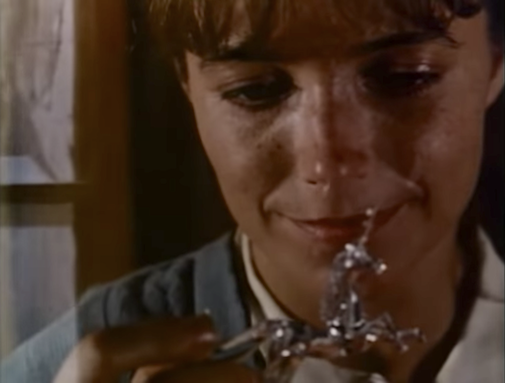
Remember way back when this Smackdown season started with 1981, and I mentioned Karen Allen as someone who somehow missed out on a well-deserved Supporting Actress nomination despite how few films Oscar bothered to recognize that year? Her barnstorming performance in Raiders of the Lost Ark is one of that adventure classic's secret weapons, building on the potential in Marion Ravenwood and delivering a tangible, electrifying character even when the script lets her down. In truth, I sometimes think of Allen alongside contemporaneous stars like Jessica Harper and Brooke Adams: singular, charismatic screen presences you could never mix up for one another despite their similar appearances, all of whom starred in some of the best, most idiosyncratic films of the ‘70s and ‘80s.
I’d also wager that Harper and Adams’ personas would suggest themselves for the role of the shy, undemonstrative Laura Wingfield in Tennessee Williams’ The Glass Menagerie more than Allen’s would. Who’d pick Marion Ravenwood (!) for a part given to Jane Wyman in 1950? Yet it was Allen who played the role onstage opposite Joanne Woodward, John Sayles (!), and James Naughton at the Williamstown Theatre Festival in 1986, and Paul Newman was so impressed by their performances that he decided to make a damn movie...
Aside from John Malkovich subbing in for Sayles, the film takes this cast and transplants Williams’ play directly to the screen. It’s a dutiful staging, if not necessarily an inspired one. Still, when the dust settles and the credits begin to roll, it’s Karen Allen who emerges with the strongest claim for providing a definitive, inspired interpretation of this long standing work of American theatre.
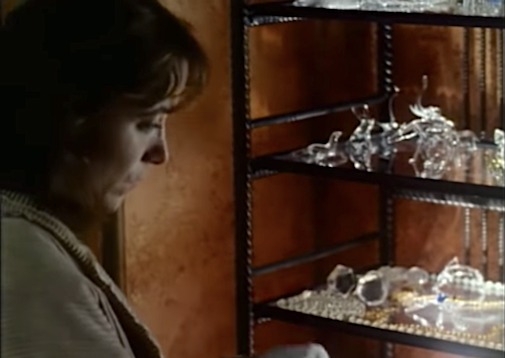
A quick refresher for anyone who didn’t first encounter The Glass Menagerie in their high school lit class: the story is centered on the Wingfield family, three disparately lonely souls trying to make ends meet in a 1930’s St. Louis apartment. Explicitly structured as the memory play of older brother and wannabe poet Tom (Malkovich), the narrative is equally focused on his frail younger sister Laura (Allen) and their mother Amanda (Woodward), a faded Southern belle who tries to find gentlemen callers for Laura when she’s not lost in reveries of her own youth.
Where Tom longs to flee his cramped home and Amanda imagines a better life for her brood, Laura wants ... what does she want? To be left alone? Does she conceive of any possible future for herself? She seems resigned to spending the rest of her life at home, tending to her collection of glass animals while her brother is out at the factory or “the movies” and her mother runs errands or sells magazine subscriptions when she isn’t homemaking. Amanda believes Laura is taking business classes but, as she eventually discovers, Laura was so anxious after her first test that she became sick and never returned. Rather than going to school, she tours museums, window shops, and sits on park benches, preferring to fight the winter chill than be overwhelmed like that again.
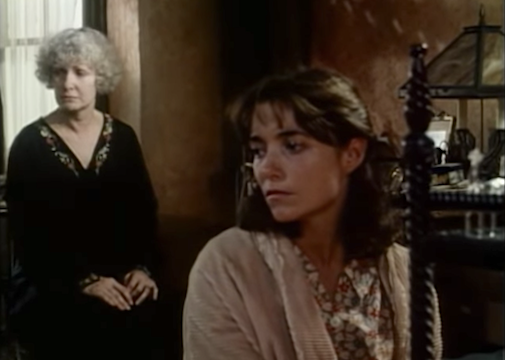
Allen refuses to play Laura’s shyness for audience sympathy or conflate it with overt fragility. Laura doesn’t read like a charismatic young woman being smothered by her environment who only needs someone to rescue her. Nor is she a simpering child in a grown woman’s body. Instead, spending most of her time in bedclothes and a faded peach robe with an impenetrably blank look on her face, Allen’s Laura seems legitimately depressed. Her wide-eye, substantive gaze indicates an attentive and thoughtful person. Minute changes in expression and posture are enough for us to guess how she’s feeling at any given moment, yet she’s just as liable to retreat into her own thoughts even when she’s staring right at whoever’s talking. Allen’s refusal to overplay Laura's limp, or make her tangibly "unwell" in some other way, forces the audience into the paradoxical space of considering her mental health even as Allen tends to her character’s privacy as carefully as a glass unicorn. The walls Laura has built around herself are sturdily fortified, and Allen refuses to externalize her psychology outside of character-appropriate moments.
If at times Allen seems too unrevealing of Laura’s interiority, she’s precise enough in delineating when and how she comes out of her shell to assure us of an actor making specific choices about her character rather than someone constructing a dour edifice instead of a real person.
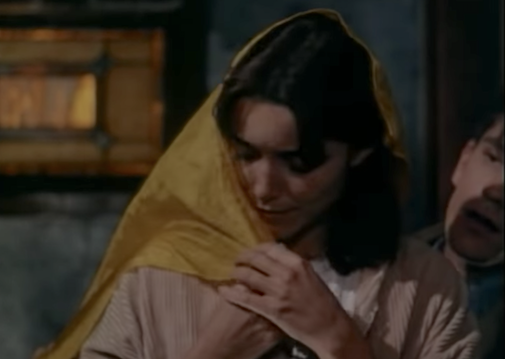
Laura’s not immune to cracking a grin at her brother’s comedic storytelling even as she’s visibly worried about him sauntering home drunk at some ungodly hour. When she gets the chance to tell her mother about her high school crush she springs to life, as if her fondness for him has woken her out of a stupor. She doesn’t theatrically parse through the emotional gradations of her dialogue as Woodward and Malkovich do theirs, though she certainly imbues them with comparable levels of feeling. Instead, Allen fills her line readings with pauses and stutters, showing us a Laura who carefully chooses her words and thinks about how to best describe her one love to her mother. Suddenly, Allen has reconfigured the ripe prose of Tennessee Williams into utterly human dialogue, without seeming out of step with the film around her. By committing to a less theatrical performance style, Allen ultimately contributing the most cinematically realized element of her film. She even inspires Newman’s direction towards some visual flourishes, like the dizzying, claustrophobic spectacle of the camera circling Laura once she learns who her brother has invited home for dinner.
That someone, as it turns out, is none other than Laura’s high school love Jim O’Connor (Naughton). Dressed in a soft, pink, slightly childish dress, Laura looks as though she’s about to be sick, telling her mother she can’t sit at the table for dinner if it’s him. Her mother is astonished by this declaration, trying to assuage Laura’s fears while dismissing the idea of her going anywhere. Amanda has to practically force her daughter to answer the door, and after limping over to let in Tom and Jim she falls completely silent before fleeing to her room. Eventually her brother coaxes her out for dinner, and when she sees Jim pull out her chair to sit next to him she faints. Laura spends dinner recuperating on the couch, recovering herself but also trying to forestall this inevitable reunion for as long as possible. The power goes out in the middle of the meal, and when Tom and Amanda retreat to the kitchen to do the dishes, Laura and Jim are left alone in the living room, their conversation held only by candlelight.
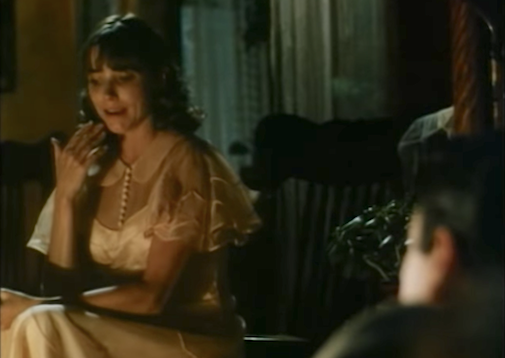
This half-hour set-piece, which feels at once like the centerpiece of The Glass Menagerie as its grand finale, is the loveliest, most complicated sequence in the film, and Allen’s performance is instrumental to achieving this. Laura loosens up a little once she and Jim start talking to each other, but she never becomes more effusive than when she discussed him with her mother. Allen maintains Laura’s reserve while engaging fully and spontaneously with Naughton. Her shyness manifests in ebbs and flows but never leaves entirely. Sometimes her anxiety is so overwhelming she can barely look at him, while at other moments she’s so besotted she can’t look at anything but him. We also better understand traits and defense mechanisms of Laura’s that have appeared elsewhere in the film - her willingness to shut down completely when presented with a reality about herself she doesn’t want to embrace, as well as an unpretentious honesty in how she expresses herself. While still leaving room for audience interpretations, Allen’s line readings sound as though Laura means exactly what she’s saying, nothing more and nothing less, even if it may not be true. Allen turns Laura’s unembarrassed remembrance of her high school interactions with Jim into a love language all its own, but she’s just as skilled at implying that Laura’s sense of self is so diminished that she cannot fully recognize herself or how she’s perceived by the world at large.
“She’s shy” and “She’s got an inferiority complex” are two of the most repeated diagnoses in The Glass Menagerie to explain What’s Wrong With Laura. Allen is able to create a version of this character who fits those descriptors without flattening her to do so. Whatever’s troubling Laura is clearly beyond the scope of those two labels, and Allen invites us to consider this for ourselves while providing another vantage to evaluate the people who call her that. What do they see in her to say that? Are they any shrewder than us? Than her? Even after Laura’s tentative, delicately kept ardor for Jim is resolved at the most ephemeral intersection of sweet fantasy and sad reality, Allen maintains a still water run deep characterization. You watch her draw back into herself, saying only a couple more lines before fading into the corner, yet even here Allen refuses full emotional and psychological transparency. Her Laura ends on a note of pained, stymying irresolution, a whimper that plays like a bang because of Allen’s thoughtful, carefully controlled performance.
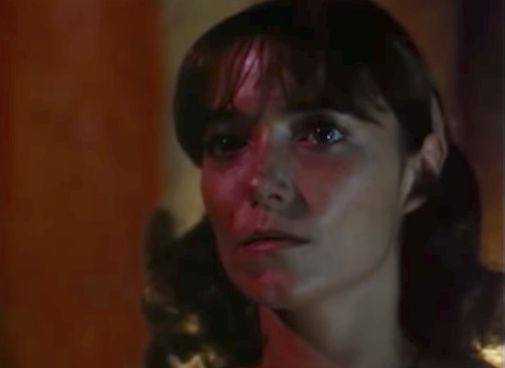
previously on the 1987 alternate ballot...
... and don't forget to Vote on the Smackdown


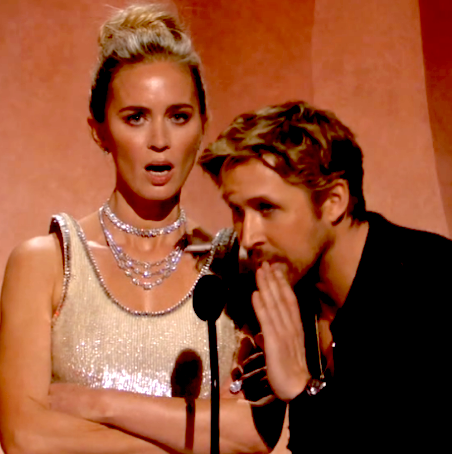
Reader Comments (8)
This is the only version of the play I have ever seen (I know, I know). But it broke my heart so thoroughly I could never sit through another version. I thought she was terrific, as was Joanne Woodward....But just a devastating play.
The autobiographical elements of The Glass Menagerie are heartbreaking. Playwright Tennessee Williams modeled Laura after his sister Rose who endured a botched lobotomy after Williams left home. His estate covered the costs of her institutionalization till her death in 1996.
I absolutely prefer the 1950 film version starring Gertrude Lawrence, Jane Wyman, Arthur Kennedy and Kirk Douglas, superb actors, especially Jane Wyman, in a moving drama.
Allen really is wonderful here, I guess it's mean to say surprisingly so but nothing she's done before or since would suggests she would have been a terrific Williams heroine. But it's such a lovely performance. She would have been on my ballot in 1981 and honestly probably for this performance in 1987.
Overall this is probably the best filmed Menagerie, even if it's only "good". Can't imagine a preference for 1950 version, which isn't terrible I guess but is hardly Williams' play, with flashbacks and a happy ending. All the roles are basically re-shaped to fit the actors, Wyman might as well be playing a different person, and Lawrence is compelling but totally miscast.
I'm old so it's the Katharine Hepburn TV version of this that I am most familiar with. I hated the 1950 movie and I've tried to like it more than once.
Hepburn of course is an interesting choice to play a southerner but she pulls it off once you forget about it. Joanna Miles as Laura was very good as I recall and I was always surprised I never really saw her again. Sam Waterston and Michael Moriarty went on to acclaim after it.
I'm not in love with the film but Allen is leaps and bounds more interesting than all of the non-Dukakis Oscar nominees.
I had no idea she had done this- she seems too strong to play the frail Laura.
Terrific article. And Karen Allen has always been an underrated actress. I hadn't wanted to see this movie when it came out, but given this piece, now I do.